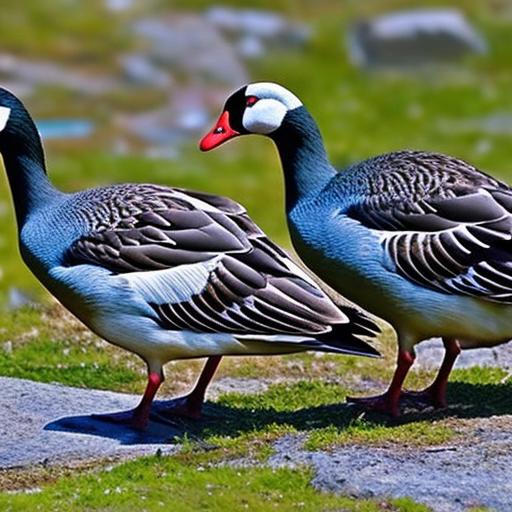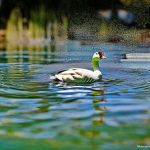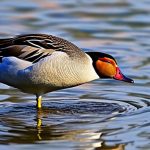Geese are large waterfowl that are known for their distinctive honking sound and V-shaped flying formation. They are highly adaptable birds that can be found in a variety of habitats, including parks, golf courses, and residential areas. Geese are social animals that live in flocks and are known for their strong family bonds.
Understanding geese behavior is crucial for effective management. Geese can cause damage to property and landscaping, pose health risks due to their droppings, and create noise pollution and disturbance. By understanding their behavior, property owners can implement strategies to deter geese from their property and minimize these issues.
Key Takeaways
- Geese are social birds that mate for life and can live up to 25 years.
- Geese can cause property damage, create health hazards, and be aggressive towards humans and pets.
- Physical barriers such as fences and netting can be effective in keeping geese away.
- Scare tactics like noise makers and predator decoys can deter geese, as well as repellents like taste aversions and visual deterrents.
- Landscaping strategies like planting tall grasses and using hardscaping can make your property less attractive to geese.
Reasons for Keeping Geese off Your Property
There are several reasons why property owners may want to keep geese off their property. One of the main reasons is the damage they can cause to property and landscaping. Geese have a voracious appetite and can quickly strip grass and vegetation from an area. They also have a tendency to trample on lawns, leaving behind unsightly patches of bare ground.
Another concern is the health risks associated with goose droppings. Goose droppings can contain harmful bacteria such as E. coli and Salmonella, which can pose a risk to humans and pets if ingested. In addition, the high nitrogen content in goose droppings can lead to nutrient imbalances in soil and water bodies, causing algae blooms and other ecological issues.
Geese can also create noise pollution and disturbance, especially during their breeding season. Their honking calls can be loud and persistent, causing annoyance to nearby residents. Additionally, geese can become aggressive when they feel threatened or when protecting their nests or young, posing a potential danger to people and pets.
Physical Barriers to Keep Geese Away
One effective way to keep geese off your property is by implementing physical barriers. Fencing is a common method used to deter geese. A fence should be at least three feet high and have small mesh openings to prevent geese from squeezing through. It is also important to bury the bottom of the fence several inches into the ground to prevent geese from digging underneath.
Netting can also be used to keep geese away from specific areas, such as ponds or gardens. The netting should be installed at a height of at least six feet to prevent geese from flying over it. It is important to regularly inspect and maintain the netting to ensure its effectiveness.
Another physical barrier option is the use of decoys and visual deterrents. Geese are territorial animals, and the presence of decoys can discourage them from entering an area. Decoys should be moved regularly to prevent geese from becoming accustomed to them. Visual deterrents, such as reflective tape or scarecrows, can also be effective in deterring geese.
Scare Tactics and Repellents for Geese
In addition to physical barriers, scare tactics and repellents can be used to keep geese away. Noise makers, such as air horns or propane cannons, can startle geese and encourage them to leave an area. Motion-activated devices that emit loud noises or flashing lights can also be effective in deterring geese.
Taste and scent repellents can also be used to make an area less attractive to geese. These repellents are typically applied to grass or vegetation and have a strong odor or taste that geese find unpleasant. Examples of taste repellents include bitter apple spray or hot pepper wax. Scent repellents, such as predator urine or garlic oil, can also be effective in deterring geese.
It is important to note that scare tactics and repellents may need to be rotated or changed periodically, as geese can become habituated to them over time.
Landscaping Strategies to Deter Geese
Strategic landscaping can also help deter geese from your property. Planting vegetation that geese dislike can make an area less attractive to them. Geese prefer short, tender grass, so planting taller grasses or native plants with tough leaves can discourage them from feeding in an area. Additionally, planting shrubs or trees near water bodies can create barriers that make it more difficult for geese to access the area.
Creating barriers with rocks or other landscaping features can also help deter geese. Geese prefer open areas where they have a clear line of sight, so creating obstacles such as rocks or hedges can make an area less appealing to them. It is important to regularly maintain these barriers to ensure their effectiveness.
Water Management Techniques to Reduce Geese Presence

Water management techniques can be effective in reducing geese presence on your property. Limiting access to water sources is one strategy that can be used. This can be done by installing fencing or netting around ponds or other water bodies to prevent geese from entering the area. It is important to ensure that the fencing or netting is properly installed and maintained to prevent geese from finding gaps or ways to bypass the barrier.
Another water management technique is the use of water deterrents, such as fountains or sprinklers. Geese are attracted to calm, open water where they can easily spot predators. By creating movement and noise with water deterrents, geese are less likely to feel safe and will be discouraged from staying in the area.
Effective Communication with Neighbors to Address Geese Issues
Managing geese effectively often requires cooperation and communication with neighbors. Geese are highly mobile and can easily move between properties, so it is important for neighbors to work together to address geese issues.
When approaching neighbors about geese problems, it is important to be respectful and understanding. Explain the issues you are experiencing and the potential impacts on property and health. Offer suggestions for management strategies and ask for their input and cooperation. By working together, neighbors can implement consistent management practices that will be more effective in deterring geese.
Legal Considerations for Removing Geese from Your Property
When dealing with geese management, it is important to be aware of the laws and regulations regarding their removal. In many areas, geese are protected under federal or state laws, and it is illegal to harm or kill them without proper permits. It is important to familiarize yourself with the specific regulations in your area before implementing any management strategies.
It is also important to follow humane methods for removing geese from your property. Non-lethal methods, such as the use of trained dogs to deter geese or egg addling to control population growth, should be considered before resorting to lethal methods. Humane removal methods not only comply with legal requirements but also promote ethical and responsible wildlife management.
Humane Options for Managing Geese
There are several humane options available for managing geese. One effective method is the use of trained dogs to deter geese. Border collies, in particular, are known for their ability to effectively chase away geese without causing harm. The presence of a well-trained dog can create a sense of fear and discomfort for geese, encouraging them to find a safer location.
Egg addling is another non-lethal method that can be used to control geese populations. This involves shaking or coating goose eggs with oil to prevent them from hatching. By reducing the number of goslings that are born each year, the overall population can be controlled without causing harm to individual birds.
Long-Term Strategies for Preventing Geese from Returning to Your Property
To prevent geese from returning to your property in the long term, it is important to implement consistent management and maintenance practices. Regularly inspect and maintain physical barriers, scare tactics, and repellents to ensure their effectiveness. Rotate or change scare tactics and repellents periodically to prevent geese from becoming habituated.
Ongoing communication with neighbors and community members is also important. By sharing information and strategies, you can work together to create a more effective geese management plan. It is also important to stay informed about new research and developments in geese management to ensure that you are using the most effective and humane methods.
Managing geese effectively requires an understanding of their behavior and the implementation of appropriate strategies. Physical barriers, scare tactics, repellents, landscaping strategies, water management techniques, and effective communication with neighbors are all important components of a comprehensive geese management plan. It is also important to be aware of the legal considerations surrounding geese removal and to prioritize humane methods. By taking a proactive and humane approach to geese management, property owners can minimize damage, health risks, and disturbance caused by geese.
If you’re looking for effective ways to keep geese off your property, you might also be interested in learning about the importance of a well-designed chicken coop. A properly constructed chicken coop not only provides a safe and comfortable environment for your feathered friends but also helps to deter unwanted visitors like geese. Check out this informative article on the Poultry Wizard website, which offers valuable insights into creating the perfect floor for your chicken coop. By implementing the right design features, you can ensure that your chickens are happy and secure while keeping geese at bay.
FAQs
What are some effective ways to keep geese off my property?
There are several effective ways to keep geese off your property, including using decoys, installing fencing, using repellents, and modifying the landscape.
What are some natural repellents that can be used to keep geese away?
Some natural repellents that can be used to keep geese away include planting certain types of vegetation, using noise deterrents, and using visual deterrents such as reflective tape or balloons.
Is it legal to harm or kill geese to keep them off my property?
No, it is not legal to harm or kill geese to keep them off your property. Geese are protected under federal law, and harming or killing them can result in fines and other legal consequences.
What are some common mistakes people make when trying to keep geese off their property?
Some common mistakes people make when trying to keep geese off their property include using ineffective deterrents, not addressing the root cause of the problem, and not seeking professional help when needed.
Can geese cause damage to my property?
Yes, geese can cause damage to property by leaving droppings, damaging vegetation, and creating nests in unwanted areas. They can also pose a safety hazard by blocking roads and walkways.
Meet Walter, the feathered-friend fanatic of Florida! Nestled in the sunshine state, Walter struts through life with his feathered companions, clucking his way to happiness. With a coop that’s fancier than a five-star hotel, he’s the Don Juan of the chicken world. When he’s not teaching his hens to do the cha-cha, you’ll find him in a heated debate with his prized rooster, Sir Clucks-a-Lot. Walter’s poultry passion is no yolk; he’s the sunny-side-up guy you never knew you needed in your flock of friends!







